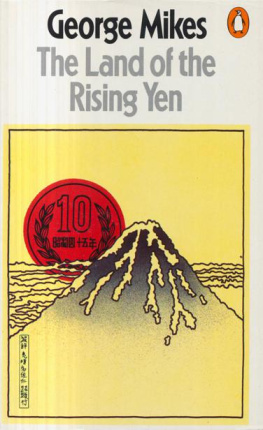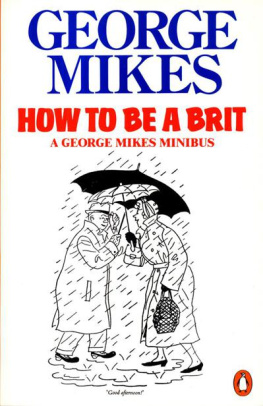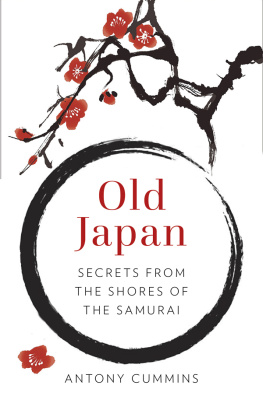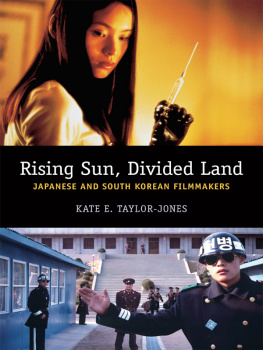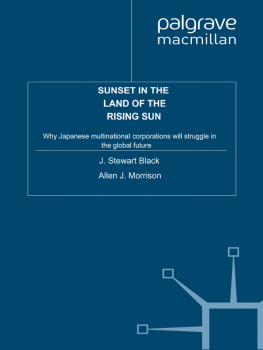George Mikes - Land of the rising yen: Japan
Here you can read online George Mikes - Land of the rising yen: Japan full text of the book (entire story) in english for free. Download pdf and epub, get meaning, cover and reviews about this ebook. year: 1973, publisher: Penguin Books, genre: Politics. Description of the work, (preface) as well as reviews are available. Best literature library LitArk.com created for fans of good reading and offers a wide selection of genres:
Romance novel
Science fiction
Adventure
Detective
Science
History
Home and family
Prose
Art
Politics
Computer
Non-fiction
Religion
Business
Children
Humor
Choose a favorite category and find really read worthwhile books. Enjoy immersion in the world of imagination, feel the emotions of the characters or learn something new for yourself, make an fascinating discovery.
- Book:Land of the rising yen: Japan
- Author:
- Publisher:Penguin Books
- Genre:
- Year:1973
- Rating:5 / 5
- Favourites:Add to favourites
- Your mark:
- 100
- 1
- 2
- 3
- 4
- 5
Land of the rising yen: Japan: summary, description and annotation
We offer to read an annotation, description, summary or preface (depends on what the author of the book "Land of the rising yen: Japan" wrote himself). If you haven't found the necessary information about the book — write in the comments, we will try to find it.
Land of the rising yen: Japan — read online for free the complete book (whole text) full work
Below is the text of the book, divided by pages. System saving the place of the last page read, allows you to conveniently read the book "Land of the rising yen: Japan" online for free, without having to search again every time where you left off. Put a bookmark, and you can go to the page where you finished reading at any time.
Font size:
Interval:
Bookmark:
PENGUIN BOOKS
THE LAND OF THE RISING YEN
George Mikes was born in 1912 in Sikls, Hungary. He studied law and received his doctorate from Budapest University. He became a journalist and was sent to London as a correspondent to cover the Munich crisis. He came for a fortnight but stayed on and made England his home. During the Second World War he broadcast for the BBC Hungarian Service where he remained until 1951. He continued working as a freelance critic, broadcaster and writer until his death in 1987.
In 1946 he published How to be an Alien, which went into thirty editions and identified the author as a humorist, although he had not intended the book to be funny. His other books include ber Alles, Little Cabbages, Shakespeare and Myself, Italy for Beginners, How to Unite Nations, How to be Inimitable, How to Scrape Skies, How to Tango, The Land of the Rising Ten, How to Run a Stately Home (with the Duke of Bedford), Switzerland for Beginners, How to be a Tank and Most Wisdom., Tsi-Tsa, English Humour for Beginners, How to be Poor, How to be a Guru, How to be a Brit and How to be God. He wrote a study of the Hungarian Revolution and is also the author of A Study of Infamy, an analysis of the Hungarian secret political police system, Arthur Koestler: The Story of a Friendship and The Riches of the Poor: A Journey round the World Health Organisation. On his seventieth birthday, in 1982, he published his autobiography, How to be Seventy.
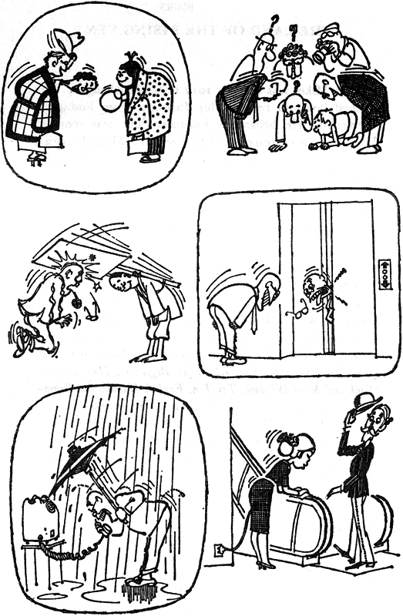
GEORGE MIKES
THE LAND OF THE RISING YEN
Japan

PENGUIN BOOKS
Published by the Penguin Group
Penguin Books Ltd, 27 Wrights Lane, London W8 5TZ, England
Penguin Books USA Inc., 375 Hudson Street, New York, New York 10014, USA
Penguin Books Australia Ltd, Ringwood, Victoria, Australia
Penguin Books Canada Ltd, 10 Alcorn Avenue, Toronto, Ontario, Canada M4V 3B2
Penguin Books (NZ) Ltd, 182-190 Wairau Road, Auckland 10, New Zealand
Penguin Books Ltd, Registered Offices: Harmondsworth, Middlesex, England
First published by Andr Deutsch 1970
Published in Penguin Books 1973
11 13 15 17 19 20 18 16 14 12
Copyright George Mikes, 1970
All rights reserved
Set in Baskerville Linotype
Printed in England by Clays Ltd, St Ives plc
Except in the United States of America, this book is sold subject to the condition that it shall not, by way of trade or otherwise, be lent, re-sold, hired out, or otherwise circulated without the publishers prior consent in any form of binding or cover other than that in which it is published and without a similar condition including this condition being imposed on the subsequent purchaser
CONTENTS
INTRODUCTION
Youll find me unchanged. And why should I change since I have found the happiness that suits me? I have accepted duplicity instead of being upset about it.
At times one wonders, doubting the facts, even when one has discovered the secrets of the good life. To be sure, my solution is not the ideal. But when you dont like your own life, when you know that you must change lives, you dont have any choice Albert Camus, The Fall (translated by Justin OBrien)
(1) HOW DARE THEY...
The world has a picture of Japan: men and women in kimonos bowing to one another ceremoniously in the shade of pagodas; voluptuous geisha-girls playing ancient stringed instruments, interrupting their playing only in order to utter a few devastating repartees; embarrassed small men and women, coming from flower-ceremonies and rushing, or rather ambling, on to tea-ceremonies, giggling apologetically and hissing furiously while disgruntled samurai commit harakiri in the background.
Stereotyped images die hard and there is always good reason for their existence. After all, American businessmen do ride in massive automobiles, smoke gigantic cigars, engage frequently in gun-battles with gangsters and when defeated jump on their fuming stallions to gallop away into the infinite emptiness of the Wild West usually to the infinite emptiness of Los Angeles or San Francisco. The few Britons who are not actually in the Coldstream Guards, sporting red tunics and bearskins and going about their business (usually some royal occasion) on proud and fussy black chargers, are all bowler-hatted stockbrokers, carrying rolled umbrellas, taciturn, reserved and stiff-upper-lipped, getting out of their Rolls-Royces every now and then to play cricket or plot the re-establishment of the Empire, while their womenfolk in cart-wheel hats, decorated with immense flowers in singularly bad taste, hold heated meetings demanding the re-introduction of hanging or protesting against the maltreatment of British dogs in Japan.
These pictures may be caricatures, but the trouble with caricatures is that they resemble the original much more than we (if we are the original) care to admit. Besides, the stereotypes represent permanence, something fixed and unalterable, and we stick to them because we are all even the most progressive, the most revolutionary among us extremely conservative; we all resent change because we know that while change is life, change is also death, bringing our own inevitable extinction in its wake. So we resent departures from the Japanese stereotype, we object to the Japanese becoming a first-class industrial nation; and so do the Japanese themselves, who nostalgically try to cling to their kimonos and keep bowing with exquisite politeness before concluding multi-million-dollar deals in computers or the building of automated electronics factories; and they always go to geisha-houses to sign the contract.
The world, of course, suffered its first shock about Japan as early as the Russo-Japanese War; but that event, at the beginning of the century, had its legendary, romantic, David-and-Goliath aspect. It was the victory of the insignificant pygmy over the tyrannical bully whom it was a pleasure to see humbled, so Japans success fired peoples imagination instead of frightening them (with the exception of the Kaiser who developed his Yellow Peril theory). Besides, Japan atoned for this victory of 1905 with defeat forty years later, so all seemed well for a while.
But Japans victory of the G.N.P. (gross national product a phrase mentioned much more often in Japan nowadays than bushido was in another era) is a more serious matter than the victories at Port Arthur, Mukden and Tsushima were. Japan has become (according to one way of measuring it) the third industrial power in the world; and the race is not yet over.
Different people react differently to this ominous phenomenon. Some speak, contemptuously, of the fruits of defeat. Defeat as we shall see in greater detail certainly had its beneficial aspects; but it also meant starvation, atom-bombs, occupation, humiliation, execution of two former Prime Ministers and some other leaders as war criminals, and long years of horrible struggle and poverty, so it was no unmitigated joy. It is not a fair view of history to state that these cunning Japanese (and Germans), recognizing the dangers of victory, deceitfully engineered their own defeat to achieve their war-aims. Thats only how it looks today; it did not happen that way.
Others resent the basic injustice of the thing. They do not think only in patterns but also in categories. Some people should wear kimonos, others should wear Western garb; some should be a nation of
Font size:
Interval:
Bookmark:
Similar books «Land of the rising yen: Japan»
Look at similar books to Land of the rising yen: Japan. We have selected literature similar in name and meaning in the hope of providing readers with more options to find new, interesting, not yet read works.
Discussion, reviews of the book Land of the rising yen: Japan and just readers' own opinions. Leave your comments, write what you think about the work, its meaning or the main characters. Specify what exactly you liked and what you didn't like, and why you think so.

